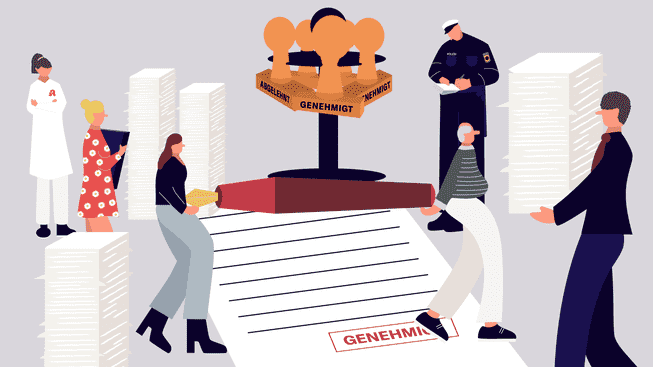At the latest when they are retired, German civil servants leave the average population far behind. The planned state reform of the traffic light coalition should also change something here.
The German administration: a lot of paper and little modern technology.
The German traffic light coalition wants to modernize the state system and – long overdue – digitize it. Right at the beginning of the coalition agreement, it is stated that the opportunities are not distributed equally for everyone. That is correct – but it also applies to the risks to at least the same extent. A modernization of the state should also keep an eye on the distribution of life risks in society.
Unemployment, poverty in old age – these risks threaten a significant part of the total population, but almost none of the five million employees in the public sector. They cannot be terminated, their salary increases, holidays and illness are covered, and it is particularly easy for them to get a loan or an apartment. Over the years and decades, a worrying imbalance has arisen here, both in terms of the distribution of risks and the distribution of benefits. Historically, the benefits of civil service have continued to expand and the disadvantages have continued to diminish.
If then there is also the impression that the public sector cannot deliver the services expected of it (e.g. current corona numbers) because it simply cannot be made to do so due to jurisdictional wrangling and inefficiency, thus affecting the whole country becomes, this is no longer communicable even to a patient people. The privileges of the professional civil service and other public services then have a legitimacy problem. The consideration of “traditional principles of the professional civil service” has constitutional status, so that the question of whether the professional civil service does not arise. But the one after the how.
Trust in the state is lost
This has already been recognized in the political arena. During the election campaign, the leader of the Union faction, Ralph Brinkhaus, called for a “reform of the century – maybe even a revolution”. Immediately after the general election in September last year, the Konrad Adenauer Foundation, which is close to the CDU, presented an 18-page position paper that came to the conclusion that Germany needed comprehensive state reform.
In addition to proposals for restructuring the content of the administration, there is also the demand that the career ordinance must be “made more flexible in the sense of performance- and competition-oriented remuneration”, responsibilities must be clearly assigned, and modern personnel and project management is required.
Even the German Civil Service Association is open to it. “The employees themselves are dissatisfied with the current situation,” says spokeswoman Britta Ibald. “Privately, they also order on the Internet, and in the office they should then work with a circulation folder and fill out forms with the citizen.” Under Merkel, feeling good has become a political principle, you didn’t want to hurt anyone, and that’s the result.
On its website, the civil servants’ association complains about the current state of public service: “More than 60 percent of people in Germany consider the state to be overwhelmed when it comes to fulfilling its tasks. There are worrying signs of a general loss of confidence in the state’s ability to perform.
High security, flat stress curve
The public service will need numerous new employees in the coming years, since around 1.3 million employees will retire within the next ten years. With the existing working conditions, however, one is not attractive for applicants.
In polls, however, it sounds different. Depending on the survey, 30 to 40 percent of young professionals want to work in the public sector. The advantages described at the beginning are what lure you there: high level of security, flat stress curve. “We know these surveys, according to which everyone wants to work in the public service, but the masses never really get there,” says Ibald. “Because when they really set foot in the office, they often back out and say: without me. Unfortunately, we are still a long way from agile working methods.»

The fact that ideas and reality diverge when it comes to work in the office keeps many applicants away.
And there is little threat of personal responsibility: even underperformers have nothing to fear. “That cannot be dismissed out of hand,” says Ibald. “Twenty years ago we tried to talk to politicians about performance payments and performance bonuses in the civil service sector, but we didn’t get very far.” This was not without controversy internally either.
“Just snoring through” is still not possible. That then has consequences. And which? “You don’t get promoted.” Anyone who lifts their eyes and looks at the shipyard workers in Mecklenburg-Western Pomerania will immediately see the difference: not being promoted still means never standing on the street.
A self-important, privileged apparatus
“We currently have completely different problems. The people in the health authorities don’t fax for fun, but because they don’t get the right equipment, there is clearly a political failure here,” says Ibald. «How are we supposed to stop the exodus from nursing, and also from the authorities? Tax officials prefer to go to tax consultant offices.”
How the situation presents itself depends on whether you are inside or outside. Working conditions in the public sector are suffering, and sick leave is high in some authorities. Anyone looking from the outside sees a cumbersome and autocratic apparatus that makes life more difficult than necessary for risk takers such as entrepreneurs. The state has only one task: to be there for the citizens. This task has many faces, but it boils down to this conclusion.
That the civil service gets away with its partial dysfunction is another indication of its privileged status. It is apparently accepted as a superior and indomitable structure to which the citizen is at the mercy. The extent of this privilege becomes particularly clear when one compares the pensions and lifetime income of employees with those of regular employees.
The average German pension for men is 1210 euros in the west and 1300 euros in the east. Women in the west receive only 730 euros, in the east at least 1075 euros. Women in the east usually paid longer. The so-called standard pension is a little higher, at 1500 euros, but you only get this if you pay in for 45 years. Few succeed in doing that. Anyone who still has to pay rent can hardly make a living from it.
Pension costs are rising and rising
Now the civil servants: Retirees receive 70 percent of their last salary at old age. Their average pension is 3160 euros, and they usually live to an advanced age. According to the Federal Ministry of the Interior, this is because only those who have passed a thorough health examination become civil servants. However, it doesn’t seem too daring to assume that the total absence of fear for Social Security contributes to longevity.
On its website, the Federal Ministry of the Interior points out that such a comparison of pensions with pensions corresponds to the comparison of “apples and pears”, since pensions have different security objectives than pensions. There is even a feasibility study on the issue of comparability. Either way, this is likely to be cold consolation for most retirees. Only 21 percent of civil servants work until they reach the statutory retirement age. Many can afford to quit earlier. A great many are also unfit for work.
In a publication from January 2020, the Federal Agency for Civic Education therefore asked the question “whether the coexistence of pension insurance and the significantly better level of benefits for civil servants still has a future”. In the political arena, there are reform ideas “against the background of growing demographic burdens and an understanding of a modern welfare state that protects and obliges the entire population under uniform conditions”. However, it would take a very long time to implement this, since pension entitlements that have already been acquired are protected by the fundamental right to property and a reorganization would only seem conceivable for those starting out in the profession.
The pension costs are significant: they amount to 51 billion euros annually; this corresponds to 1.5 percent of the gross domestic product. In addition, there are 8.1 billion for the benefits for the surviving dependents. These costs will continue to rise as 1.3 million officers retire in the coming years. It doesn’t make sense to approach the pensions, DBB boss Ulrich Silberbach recently told the “Frankfurter Allgemeine”. They are also justified because they are faced with “at most second-class remuneration in active professional life”. He drew a comparison with lawyers in large law firms who could only laugh about the civil servants’ salaries. However, other sources contain opposite statements.
Administration is also a location factor
It is not good news for Germany as an industrial location when young people are already striving for security and convenience. Their ideas and work performance are important to make the economy competitive. If they go into public service, these resources are lost. And: The members of the expensive apparatus are paid from tax money; they themselves contribute only indirectly to filling the state treasury. They do pay taxes, but on an income that is in turn financed by taxes. They also do not pay into the pension fund.
The coalition agreement gives priority to administrative reform – a functioning state is also a location factor that should not be underestimated. To do this, the entire administrative organization would have to be fundamentally modernized.

The modernization of the administration should also be made possible thanks to digitization, among other things.
“We either need a lot more people, or we’ll do a task review: What should the state still do and what not?” Britta Iberg summarizes the situation.
The paper by the Konrad-Adenauer-Foundation also pursues this idea. The rigid separation should then be relaxed. The twelve authors, including former Interior Minister Thomas de Maizière and several members of parliament, are calling for lateral and career changers to find it easier to switch to the public sector. The aim here would be more flexibility and more fairness in terms of performance.
The traditional principles of professional civil service also include the performance principle and the principle of selecting the best. It is doubtful whether these principles are always adhered to – all too often loyalists are simply provided with positions that ensure them a comfortable livelihood without stress. If corrective action is not taken here, the professional civil service will move even further away from its ideal in the future. The basis is Article 33 of the Basic Law, which stipulates the principle of selecting the best.
The fundamental right serves the performance principle. Those who can do what is necessary and who have already shown that they can do something should become officials. The goal pursued by the regulation in the Basic Law is currently not being achieved in the desired form: it is the functionality and professionalism of the public service.
